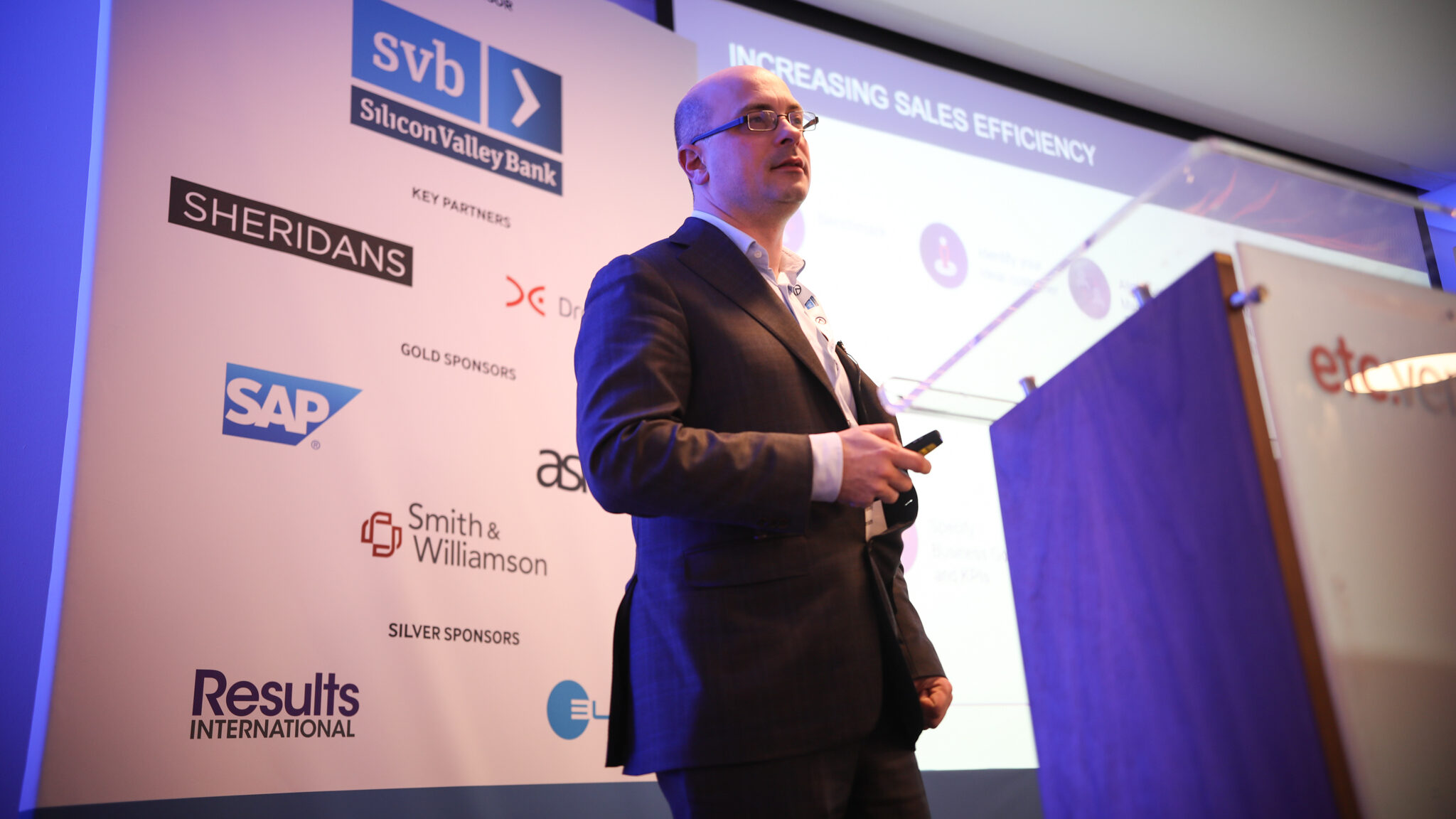When companies grow rapidly, they also need to mature rapidly. Netcetera’s Chief Growth Officer Darko Butina explains what that means, why it matters and how to do it. He also describes why Netcetera invested in the software startup Cognism.

Chief Growth Officer, Netcetera
Darko Butina is Chief Growth Officer and Member of the Management Board of Netcetera, a Swiss Software company with more than 550 employees founded in 1996. Furthermore, Darko is the co-founder of Securities Grid, a white label tokenized securities issuance platform. He successfully led companies of different sizes in different countries and managed the turnaround of Slovenia’s largest online retailer as a CEO.
Growth is what every startup aspires to. Why would there be a problem with growth?
People organize in companies because when they band together, they achieve more than on their own. As an organization grows, it becomes increasingly difficult to ensure that everybody pushes in the same direction. Despite the many modern management approaches dealing with this issue, a lack of focus across the organization emerges as a major problem accompanying growth. It is caused by the absence of structures that tie the company together.
What can be done about it?
The first important thing is to realize the challenge early enough. The second step is to admit that you need help with it. This does not mean that as a founder you need somebody telling you what to do. Instead, you need to bring people on board that help you steer the company, not just people that drive results. For that, you have to hire senior people. You need some adults in a startup, in the sense of people who know how to establish structures and processes.
When does this become an issue?
This depends on the capabilities of the founders and the team. A team diverse in terms of experience guided by several founders will develop structural relationships easily among themselves. However, if you are a single founder with a young team you might want to address this issue quite early, when you have just a few dozen people.
Isn’t there the danger that these adults bring along bad habits they have learned in a corporate environment?
Corporate players tend to be toxic for any environment, including corporations. You want to avoid them in any case, because regardless of their experiences, they will primarily operate politically and try to profit on the account of others. You want to engage senior people who are entrepreneurial, are able to adapt and really respect others. With such persons, the benefits they bring vastly outweigh any potential bad habits they bring along.
“Corporate players tend to be toxic for any environment, including corporations”
How do you find these senior people as a startup and how do you pay for them?
Personal network of the founders is an obvious choice to start the search. However, startups should also be active and vocal about that and proactively search for the right seniors. They should network and discuss the topic with peers and others. In the first stages, startups do not necessarily need the senior for 100% of the time. Therefore, they can offer the right person interesting challenge and package for a limited engagement – in the form of an advisory role, board of director’s role or similar. Such roles are in the early stages usually compensated primarily with shares and to a lesser extent with cash. Which means that the startup should be able to afford it.
What are concrete actions you have taken in such growth situations?
I have to admit I am usually in the role of the adult in the room. In this role, I try to influence and work together with founders and management to better organize and lead the company by defining clearer strategy, organization, goals and certain processes. I also push for setting up and improving governance basics like clear authorities and responsibilities, reporting and data driven decision-making.
What is really the limiting factor for growth?
Let’s take the example of a company that sells consulting services. Sales of this company are a function of the number of people employed. The founders onboard and educate newcomers, and teach them how to represent the company towards the customer. This setup will strictly limit the number of new people that can be hired successfully. If more people are hired, they will lack guidance, and consequently, underperform, which will leave them dissatisfied. Sales would trail the growing cost base and the burn rate would increase, until, eventually the company crumbles under its own weight.
You mentioned onboarding people and teaching them. Is there such a thing as company culture?
It is a loose term that necessitates proper definition. There are methods such as questionnaires to gain insights into a company’s culture. For me it is intangible. Not unimportant, though. It essentially boils down to the convictions the founders portray inside the company, which then, hopefully, resonate on the outside as well. I would not go as far as Richard Branson who said that you should put your staff first and your customers second. However, it is true that employees who feel appreciated and valued will go beyond their job description.
Many tech startups in Switzerland encounter a very specific barrier to growth, namely, the difficulty of hiring software engineers. Unsurprisingly, they resort to measures such as nearshoring and build up teams in other European countries. What do you make of that?
Startups have limited funds and need to make them count. The cost of living and salaries are high, especially here in Zurich. From a startup’s perspective, it makes sense to be able to buy more technical capacity somewhere else than you get here for the same amount of money. And to be honest, working with remote teams has become much easier than in the past, not just technologically. For people under 30 who have grown up with social media, working remotely is natural.
Why is it so hard to find software developers in Switzerland?
This is not just a problem for startups but for larger companies that need talent as well. The market for developers is competitive. The large global players will always be able to outspend you. Therefore, you try to compete on intangibles such as offering a better life-work balance, more interesting work content and more fun. However, costs are not the only reason for nearshoring. At Netcetera, we sell complex products internationally and customers sometimes need to interact with our engineers. This is why it makes sense to have them also closer to our international customers.
Netcetera has grown substantially in the past but it is not old yet. You were instrumental in Netcetera’s investment in the software startup Cognism and sat on Cognism’s board for some time. Why does a software firm invest in a startup?
Startups look at things differently. Mature companies should value that insight.
Can you be a bit more specific?
It was very inspiring to see what kind of supercharged growth a software company can be capable of. Cognism was founded in 2016. When we invested, they had no revenues to speak of. Now, just three years later, they’re raking in millions of recurring revenue and are still growing at an impressive pace. And we use Cognism’s product to gain additional customers outside our circle of trust.
What convinced you to invest in the first place, when Cognism did not have much traction?
The founder James Isilay managed to assemble a small but strong team, and what they have developed looked solid. James pioneered a novel approach to the problem of stale data that salespeople struggle with. The solution Cognism proposed is based on having good quality data, but also on the right timing to contact people. That persuaded us to invest.
Data quality is a very abstract concept. What is the real reason companies would spend money on this?
Let’s assume you’re a B2B salesperson. You have thousands of phone numbers you could call. However, the number of calls you manage to do every day with the right preparation is more like 10. It matters a lot who exactly you are going to call next. You might try to segment your customers according to revenue and such to decide who is worthy of attention. But this is the wrong approach. You should call the people that want to buy from you first, not only based on their size is. This is the difference between data and actionable data. Cognism’s products help salespeople close sales faster. This allows companies to grow faster. It is no surprise that Cognism is successful with such a value proposition.
“Cognism’s products help salespeople close sales faster.”
Which, in turn, makes it a successful investment for you so far. This example shows that it can be beneficial for corporations to invest in startups in different ways.
You hear this line over and over, but in reality, not many corporations are serious about it. Let’s face it, a corporation is a stable business that plans for the next few years, while startups don’t know if they survive the next few months. Partnering under such circumstances sounds a bit scary. You must be able to deal with this uncertainty as a corporate if you want to get serious about it. For this, in turn, you need people with startup experience in the corporate, especially in management. Do you have the freedom to try things even if they might fail? I would argue that in most corporates, you do not. It would amount to change in mindset most corporates are not ready for.
What made you such an advocate of startups?
I’m not interested in startups per se. I am interested in technology, in what it enables you to do, how it can improve our lives and make them easier. I wrote my first code as a kid on a Sinclair Spectrum. Even if I didn’t go into coding later, the fascination persists. I am interested in enterprise strategy as well. However, in big companies, you have no impact on strategy unless you’re on the top. Guess what, in startups, everything is about strategy. Because unlike in a big organization, every single step you take today affects directly where you stand tomorrow.
Written by
WITH US, YOU CANCO-INVEST IN DEEP TECH STARTUPS

Verve's investor network
With annual investments of EUR 60-70 mio, we belong to the top 10% most active startup investors in Europe. We therefore get you into competitive financing rounds alongside other world-class venture capital funds.
We empower you to build your individual portfolio.
More News
04.02.2022
“The maths
don’t lie”
James Isilay built sales tech startup Cognism into a growth machine and just raised a massive Series C financing round. In this interview, he talks about his numbers-based management approach, the importance of outbound sales and how he plans to grow Cognism into a unicorn.
12.01.2022
“Startup jobs
aren’t for everyone”
The market for startup jobs has evolved rapidly, explains Lukas Rippitsch from Speedinvest Heroes. The problem for startups is that almost any role is difficult to hire and that candidates need a certain mindset. But who exactly is the perfect hire for a startup?
05.02.2021
Getting access to the best startup investment opportunities
As the returns of startup investments are predominantly determined by a few rare successes, getting access to the best opportunities is quintessential. This is more difficult than it sounds.
Startups,Innovation andVenture Capital
Sign up to receive our weekly newsletter and learn about investing in technologies that are changing the world.




